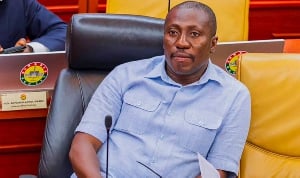The incident involving Minority Leader Alexander Kwamena Afenyo-Markin and a parliamentary cameraman highlights the delicate balance between media coverage and the preservation of decorum within the legislative chamber. Afenyo-Markin accused the cameraman of selective filming, alleging that the camera operator focused on him after he removed his shoe due to discomfort, while giving preferential treatment to the Majority Leader. This perceived bias, according to Afenyo-Markin, resulted in the broadcast of footage that seemed deliberately aimed at humiliating him. His concern underscores a broader issue regarding the potential for media coverage to be manipulated for political gain, thereby compromising the integrity of parliamentary proceedings.
Afenyo-Markin’s primary argument centers on the perceived partiality of the cameraman. He questioned why the camera operator chose to focus on him during a moment of personal discomfort, juxtaposing this with the allegedly more respectful coverage afforded to the Majority Leader. This selective focus, he contended, suggests a deliberate attempt to portray him in a negative light, potentially influencing public perception and undermining his position within Parliament. The incident raises questions about the ethical responsibilities of media professionals operating within the legislative sphere and the need for impartial and balanced coverage, irrespective of political affiliations.
The Minority Leader’s remarks extend beyond the specific incident, touching upon the potential ramifications of biased media coverage within Parliament. He warned against the use of cameras as tools for political point-scoring, emphasizing that such actions could erode trust and respect within the chamber. Afenyo-Markin’s appeal for neutrality underscores the importance of maintaining a professional and respectful environment where all members can engage in parliamentary discourse without fear of being unfairly targeted or misrepresented. This call for professionalism applies not just to cameramen but to all media personnel covering parliamentary proceedings.
Afenyo-Markin’s concern reflects a broader apprehension about the potential for the media to influence political narratives. By selectively highlighting certain moments and downplaying others, media coverage can shape public perception and potentially sway political outcomes. Within the context of Parliament, this power dynamic can be particularly sensitive. Biased coverage can not only damage the reputation of individual members but also undermine the overall credibility and integrity of the legislative process. The incident underscores the importance of media literacy and the need for critical consumption of news and information, especially in the politically charged environment of parliamentary proceedings.
The call for neutrality and professionalism in parliamentary media coverage is essential for several reasons. Firstly, it ensures that the public receives a balanced and accurate account of parliamentary debates and decisions. Secondly, it protects the dignity and reputation of all members of Parliament, allowing them to perform their duties without fear of unfair or biased portrayal. Thirdly, it upholds the integrity of the legislative process itself, ensuring that it remains free from undue media influence or manipulation. These principles are crucial for maintaining public trust in the democratic process and ensuring the effective functioning of Parliament.
The incident serves as a reminder of the critical role played by media in a democratic society. While media freedom is essential, it must be exercised responsibly and ethically. In the context of parliamentary proceedings, this means providing balanced and unbiased coverage that reflects the diversity of opinions and perspectives within the chamber. It also means avoiding the temptation to sensationalize or manipulate footage for political gain. By upholding these principles, media professionals can contribute to a more informed and engaged citizenry while simultaneously protecting the integrity and effectiveness of the legislative process. The incident involving Afenyo-Markin highlights the ongoing need for dialogue and reflection on the complex relationship between media, politics, and the functioning of democratic institutions.














